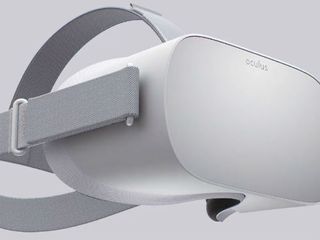Oculus Preps Debut of Wireless, Stand-Alone VR Headset

Hoping to stoke a mass market for virtual reality, Facebook-owned Oculus has introduced a wireless, stand-alone headset called the Oculus Go that will start at $199 and ship early next year.
The new product will be a follow on to the Rift, which needs to be tethered to a high-power PC, and Samsung’s Gear VR, which runs Oculus software but needs to be paired to a compatible smartphone. Oculus announced last fall that it was developing a stand-alone headset.
Oculus is in a race to get a stand-alone, high end VR product to the market, as Google is also pushing ahead with a standalone VR design that runs its Daydream platform, with several hardware partners already on board to build it.
RELATED: Google CE Partners to Debut Standalone VR Headsets in 2017
Oculus said the standalone headsets “represent a totally new phase of VR hardware,” noting that the Oculus Go aims to be lightweight thanks in part to a new fabric for the facial interface, and claiming that the device’s high-resolution, fast-switch LCD screen will boost visual clarity and reduce the “screen door effect” of earlier generation models, along with lenses that widen the field of view and reduce glare.
The new product will also integrate spatial audio, with speakers built into the headset.
Watch a brief promo about the Oculus Go:
Multichannel Newsletter
The smarter way to stay on top of the multichannel video marketplace. Sign up below.
“I am more committed than ever to the future of virtual reality,” Facebook CEO Mark Zuckerberg said at the Oculus Connect conference, according to the Los Angeles Times. Mark Zuckerberg also expressed a goal to bring VR to 1 billion users.
Oculus also offered an update on its work around project Santa Cruz, demoing a positionally-tracked headset with two controllers that will bring a more immersive experience to an untethered Rift headset.
Next year, the company plans to launch Oculus Venues, a social VR platform that will let users watch concerts and movies with up to 1,000 others in a virtual space.
Microsoft is also getting into the social VR game following its acquisition of Altspace VR.
